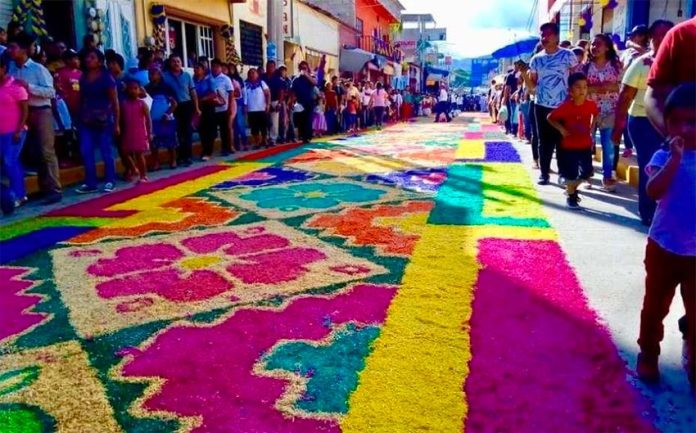Daily life in the streets of Tlapa de Comonfort, Guerrero, came to a standstill yesterday but not because of another wave of violence.
It was time for a yearly celebration dedicated to an image of Jesus Christ that mixes pre-Hispanic traditions with modern acts of faith.
Early in the morning on October 23 the main streets of the eastern Guerrero city are closed off to traffic and entire families begin working on what will become colorful and ephemeral sawdust carpets.
Each carpet will vary in design and intricacy, but all are dedicated as an offering to el Señor del Nicho.
Traditions in pre-Hispanic times called for the paths followed by dignitaries and other prominent citizens were to be adorned with intricate carpets made out of flowers and petals.
The custom has remained alive over the centuries. Guadalupe Oliveros Cantú told the newspaper Milenio that “my grandparents said one must throw flowers on the road every time a saint passed by in procession. We now make sawdust carpets because using flowers is a bit more complicated.”
Motifs of daily life and worship are captured in the carpets, such as farming activities on the hilly landscape of Tlapa or the traditional huipiles or tunics — intricate and colorful themselves — worn by local women. It’s all about “happiness, party, religion, faith and thanksgiving,” explained Oliveros.
Preparations for the Señor del Nicho, or Lord of the Niche, festivities start days before with the coloring of the sawdust. On October 23, the streets are swept and cleaned before the basic design is traced with a white chalk. The arduous task of filling in the design with sawdust then follows.
This year some of the designs depicted current events, such as demanding a stop to a wave of femicides and a call for justice in the case of the 43 missing students from Ayotzinapa.
Later in the day, the colorful carpets line the route of a procession in which a three-meter-tall black crucified Christ figure is carried through the streets of Tlapa.
The people lie on the carpets they worked on all day, awaiting the arrival of the procession and hoping to be blessed.
Not so blessed is the city. Like many others in Guerrero, it suffers from waves of violence produced by feuding criminal gangs.
Source: Milenio (sp)
